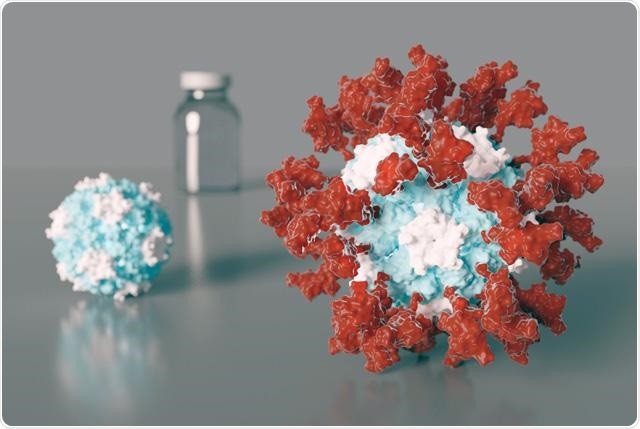A new nanoparticle vaccine candidate developed for the novel coronavirus creates virus-neutralizing antibodies in mice at levels that are 10 times higher than is observed in individuals, who have recovered from the COVID-19 disease.

Artist’s depiction of an ultrapotent COVID-19 vaccine candidate in which 60 pieces of a coronavirus protein (red) decorate nanoparticles (blue and white). The vaccine candidate was designed using methods developed at the UW Medicine Institute for Protein Design. The molecular structure of the vaccine roughly mimics that of a virus, which may account for its enhanced ability to provoke an immune response. Image Credit: Ian Haydon/University of Washington Medicine Institute for Protein Design.
The vaccine candidate, designed by researchers from the University of Washington School of Medicine in Seattle, has been transferred to two firms for clinical development.
When compared to the vaccination with the soluble SARS-CoV-2 Spike protein, on which several top COVID-19 vaccine candidates are based on, the novel nanoparticle vaccine generated 10 times more neutralizing antibodies in mice, even at six times lower vaccine dose.
In addition, the data demonstrates a robust B-cell response following immunization, which can be crucial for immune memory and a long-lasting vaccine effect. When the nanoparticle vaccine is injected into a single nonhuman primate, it produced neutralizing antibodies that targeted many different sites on the SARS-CoV-2 Spike protein.
Accordion to the researchers, this may protect against the mutated viral strains, in case they arise. The Spike protein is said to be a part of the coronavirus infectivity machinery.
The latest findings have been published in the Cell journal. The study’s lead authors are Alexandra Walls, a research scientist in the laboratory of David Veesler; and Brooke Fiala, a research scientist in the laboratory of Neil King. Veesler is an associate professor of biochemistry at the University of Washington School of Medicine, and King is an assistant professor of biochemistry at the University of Washington School of Medicine.
The team developed the vaccine candidate using structure-based vaccine design methods developed at the University of Washington Medicine. This vaccine candidate is a self-assembling protein nanoparticle that exhibits 60 copies of the c the SARS-CoV-2 Spike protein in a highly immunogenic array. The molecular structure of the vaccine almost resembles a virus, which may account for its improved potential to stimulate an immune response.
We hope that our nanoparticle platform may help fight this pandemic that is causing so much damage to our world. The potency, stability, and manufacturability of this vaccine candidate differentiate it from many others under investigation.”
Neil King, Assistant Professor of Biochemistry, University of Washington School of Medicine
King has also invented the computational vaccine design technology at the Institute for Protein Design at the University of Washington Medicine.
Scores of vaccine candidates for COVID-19 disease are being developed worldwide. Several of these vaccines need large doses, cold-chain shipping and storage, and complex manufacturing. An ultra-potent vaccine that is easy to produce, safe and effective at lower doses, and stable outside of a freezer could allow vaccination against COVID-19 infections on a global level.
I am delighted that our studies of antibody responses to coronaviruses led to the design of this promising vaccine candidate.”
David Veesler, Associate Professor of Biochemistry, University of Washington School of Medicine
Veesler also spearheaded the idea of a multivalent receptor-binding domain-based vaccine.
Source:
Journal reference:
Walls, A. C., et al. (2020) Elicitation of potent neutralizing antibody responses by designed protein nanoparticle vaccines for SARS-CoV-2. Cell. doi.org/10.1016/j.cell.2020.10.043.